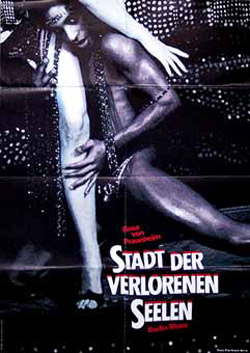| City of Lost Souls | |
|---|---|
 Theatrical release poster | |
| Directed by | Rosa von Praunheim |
| Written by | Rosa von Praunheim |
| Screenplay by | Rosa von Praunheim |
| Produced by | Rosa von Praunheim |
| Starring | |
| Cinematography | Stephan Köster |
| Music by | Holger Münzer |
Release date |
|
| Country | West Germany |
| Languages |
|
City of Lost Souls (German : Stadt Der Verlorenen Seelen) is a 1983 German musical film directed by Rosa von Praunheim and performed by drag queens, travesty artists and transgender people. The film received international attention and became a cult movie beyond the LGBT community. [1]